 MyCatBreeds
MyCatBreeds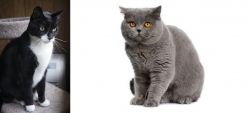 Tuxedo is originated from United States but British Shorthair is originated from United Kingdom. Both Tuxedo and British Shorthair are of same weight. Both Tuxedo and British Shorthair has same life span. Both Tuxedo and British Shorthair has same litter size. Tuxedo requires Moderate maintenance. But British Shorthair requires Low maintenance
Tuxedo is originated from United States but British Shorthair is originated from United Kingdom. Both Tuxedo and British Shorthair are of same weight. Both Tuxedo and British Shorthair has same life span. Both Tuxedo and British Shorthair has same litter size. Tuxedo requires Moderate maintenance. But British Shorthair requires Low maintenance
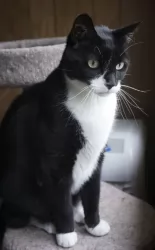 The Tuxedo cat is essentially a black and white cat and the name comes from him looking like he is dressed in a formal tuxedo.
The Tuxedo cat is essentially a black and white cat and the name comes from him looking like he is dressed in a formal tuxedo.
Tuxedos aren’t a new cat breed and they have been around for thousands of years. Tuxedo is merely describing the coat of the cat. So the Tuxedo cat isn’t a cat breed but rather a pattern color. A Persian cat as an example, can be a tuxedo cat because of its coat.
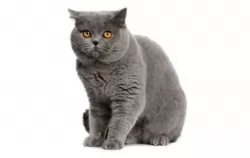 A cat breeder, Harrison Wier took a street cat of Britain and with an intensive breeding program, transformed it to the British Shorthair.
A cat breeder, Harrison Wier took a street cat of Britain and with an intensive breeding program, transformed it to the British Shorthair.
The British loved this beautiful pedigree cat. During the Second World War, the British Shorthair all but disappeared but re-emerged as a popular cat that is today accepted in cat registries around the world.
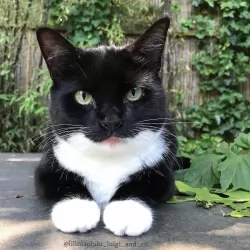 A tuxedo cat has distinct coat colors. Their bicolor coats are soft and sleek and sometimes the colors aren't limited to just black and white but they can be orange, gray or tortoiseshell.
A tuxedo cat has distinct coat colors. Their bicolor coats are soft and sleek and sometimes the colors aren't limited to just black and white but they can be orange, gray or tortoiseshell.
Because Tuxedo cats aren’t a breed, nothing is really set in stone with them and their size ranges. This means he can weigh between 3 and 7kg or 8 or even 9kg. The eyes of the Tuxedo cat are nearly always green.
The Tuxedo cat’s personality is varied as well because it can be any breed of cat. There are some Tuxedo cat owners who will say that their cats have a definite Tuxedo personality, but there is no research that indicates that these cats have a particular personality.
They are all different. Most Tuxedo cats however are friendly, social, loving, and lively.
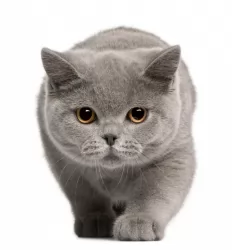 The British Shorthair is a medium to large-sized cat and he can be anything from 5 to 9kg. He has a short to medium-length dense coat that can either be a solid color, bi-color tortoiseshell or patterned.
The British Shorthair is a medium to large-sized cat and he can be anything from 5 to 9kg. He has a short to medium-length dense coat that can either be a solid color, bi-color tortoiseshell or patterned.
The coat becomes thicker and longer in the winter. This is a robust, strong cat, being heavily muscled with heavy bones. The cat also has a broad chest with thick, strong legs. The ears are fairly small and the round eyes give him a totally amicable expression on his face.
The British Shorthair is an amicable cat and makes a superb companion as it's an easy-going cat that adores his human family, being loyal towards them.
The British Shorthair is an active cat and it is able to get by on his own for a few hours without human company. If you do work particularly long hours and you go out a lot, it will be kind to perhaps get another cat for him as a friend.
He is quiet and undemanding and because he is big and heavy he doesn’t like being carried around.
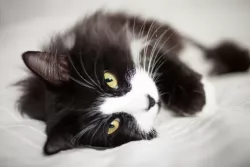 The tuxedo cat is such a sport - always up for fun and games. Cats like the tuxedo are always a great choice of pet.
The tuxedo cat is such a sport - always up for fun and games. Cats like the tuxedo are always a great choice of pet.
Cats like the tuxedo are also low maintenance and he is clever enough to even have a bit of training.
The tuxedo cat, even though he likes the outdoors, can also be an apartment cat. He also gets on well with children and other pets in the home. Having a tuxedo in the home is guaranteed to fill your home with joy, and you owe it to him to provide him with lots of love and attention.
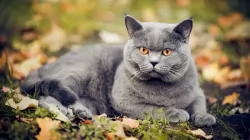 The British Shorthair is such a companionable cat, being intelligent and affectionate, even though he isn’t a lapcat as such.
The British Shorthair is such a companionable cat, being intelligent and affectionate, even though he isn’t a lapcat as such.
That doesn’t mean he doesn’t love being around his human companions. He does and is loyal to them.
They’re laid back cats and are capable of getting on well with children in the home as well as with other pets. He just loves lazing around in the sun and can spend a few hours on his own without feeling anxious or lonely.
These cats are really great companions and they make themselves at home in different lifestyles, whether you live in the countryside or in town and whether you are single, a couple or a family with children and other pets.
Easy to care for, the British Shorthair cat is guaranteed to make you an excellent companion.
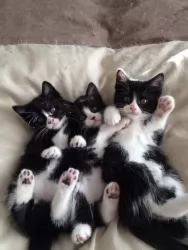 The Tuxedo cat has no real health concerns and that is just another reason why they make such popular pets. There are, however, always health issues that a cat can succumb to.
The Tuxedo cat has no real health concerns and that is just another reason why they make such popular pets. There are, however, always health issues that a cat can succumb to.
This is caused by kidney disease. It is one of the leading causes of death in older cats, and causes can include age but also genetics.
Your cat can show a number of symptoms such as excessive urination, nausea, terrible thirst, dehydration, constipation, and loss of appetite.
There is no cure for feline kidney disease but it can be treated and managed, and that is why you will need to see the vet.
This is the dreaded feline distemper for which your cat will need to be vaccinated against. It is a highly contagious viral disease, with kittens being more at risk.
After contracting the disease. It can spread through bodily fluids as well as fleas and is mostly transmitted by contaminated food and water bowls as well as litter trays.
The disease affects the intestinal tract of the cat and attacks the immune systems. Your cat will be vomiting, have diarrhea and anemia and he will have loss of appetite, lethargy and be totally and utterly down in the dumps.
Cancer is common in cats of all ages. When you brush your Tuxedo, be aware of any unusual lumps. Lymphoma is a common cancer in cats.
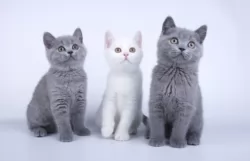 These beautiful cats are a robust, healthy type of cat breed and if you care well for him, you aren’t going to be taking him along to the vet too often. He can also live to be up to 20 years of age.
These beautiful cats are a robust, healthy type of cat breed and if you care well for him, you aren’t going to be taking him along to the vet too often. He can also live to be up to 20 years of age.
This cat has been bred with Persians in the past, so this should alert you to some of the diseases that this particular cat breed is susceptible to. It makes the cat a little bit vulnerable to polycystic kidney, an inherited condition in cats that causes cysts to form in the kidneys. They are small at first but they can grow bigger and actually result in kidney failure.
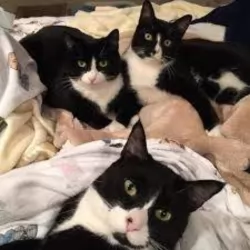 The Tuxedo cat is cared for in much the same way that you would care for any other cat really.
The Tuxedo cat is cared for in much the same way that you would care for any other cat really.
The coat of the Tuxedo requires no special treatment as the coat isn’t really ever long. Simply brush it at least once a week to reduce matting and dust collecting on the coat. You want to keep it shiny and sleek.
Provide a scratching post and a climbing tree as these are both taking care of natural instincts of a cat – to scratch and to leap.
Ensure your pet isn’t bored. Provide him with plenty of opportunities to have fun and to play. Provide him with interactive toys to keep him amused.
Cats like to sleep quite a bit so provide him with a nice soft bed in a quiet area.
If your Tuxedo is an indoor cat, he will need a litter box in a quiet area. Be sure to clean the litter box of feces every single day. Make sure that the actual litter is kept clean and tidy.
Your Tuxedo cat should be fed the same diet as any other cat. This is because every cat there is is a carnivore and their diet has to be made up of meat. A wet food diet or a dry food diet is available but make sure it is always of the highest quality. This will ensure your pet gets all the nutrients to ensure good health. Discuss your cat's s dietary needs with your vet if you are in any doubt.
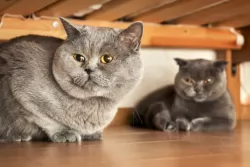 The British Shorthair is a fairly large, robust cat but that certainly doesn’t mean he must be fat. Being overweight can bring about a range of health issues and you want to follow an appropriate diet for him ad see that he gets enough exercise.
The British Shorthair is a fairly large, robust cat but that certainly doesn’t mean he must be fat. Being overweight can bring about a range of health issues and you want to follow an appropriate diet for him ad see that he gets enough exercise.
When it comes to feeding your British Shorthair, always look out for the very best, most nutritious food there is as he is a big cat.
You want to ensure your pet gets enough protein as cats are carnivores - they’re meat eaters and they require chicken, beef and fish. You can give your cat some cooked egg as they are an excellent source of protein.
Be very careful not to be tempted to give your cat chocolates, grapes, nuts, onions or garlic as foods like this are toxic for your cat and can cause him pain and discomfort.
Remember to ensure that there is always a constant supply of fresh, cool water for your cat. If you’re wondering what to feed your cat or you have any other concerns, don’t hesitate to speak to your vet.
Brush your British Shorthair when he starts to shed his winter coat and trim the nails.
Do things for your cat that you would do for your own human child. This is your beloved fur-child and you want him to be happy and healthy.
Check inside his mouth to make sure there aren’t any loose or blackened teeth that could be causing him terrible pain. Also, check inside his ears for signs of redness.
Your British Shorthair is an elegant, clean type of cat so you want to keep his litterbox nice and clean for him.